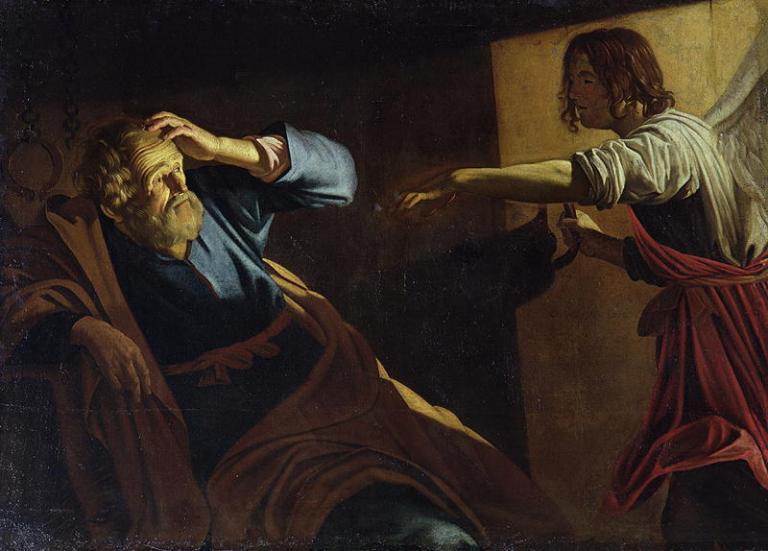
(Wikimedia Commons public domain image)
There is an amusing story in Acts 12. I suppose, of course, that the amusement of it is enhanced by not being an ancient Judean prison keeper or the apostle James:
12 Now about that time Herod the king stretched forth his hands to vex certain of the church.
2 And he killed James the brother of John with the sword.
3 And because he saw it pleased the Jews, he proceeded further to take Peter also. (Then were the days of unleavened bread.)
4 And when he had apprehended him, he put him in prison, and delivered him to four quaternions of soldiers to keep him; intending after Easter to bring him forth to the people.
5 Peter therefore was kept in prison: but prayer was made without ceasing of the church unto God for him.
6 And when Herod would have brought him forth, the same night Peter was sleeping between two soldiers, bound with two chains: and the keepers before the door kept the prison.
7 And, behold, the angel of the Lord came upon him, and a light shined in the prison: and he smote Peter on the side, and raised him up, saying, Arise up quickly. And his chains fell off from his hands.
8 And the angel said unto him, Gird thyself, and bind on thy sandals. And so he did. And he saith unto him, Cast thy garment about thee, and follow me.
9 And he went out, and followed him; and wist not that it was true which was done by the angel; but thought he saw a vision.
10 When they were past the first and the second ward, they came unto the iron gate that leadeth unto the city; which opened to them of his own accord: and they went out, and passed on through one street; and forthwith the angel departed from him.
11 And when Peter was come to himself, he said, Now I know of a surety, that the Lord hath sent his angel, and hath delivered me out of the hand of Herod, and from all the expectation of the people of the Jews.
12 And when he had considered the thing, he came to the house of Mary the mother of John, whose surname was Mark; where many were gathered together praying.
13 And as Peter knocked at the door of the gate, a damsel came to hearken, named Rhoda.
14 And when she knew Peter’s voice, she opened not the gate for gladness, but ran in, and told how Peter stood before the gate.
15 And they said unto her, Thou art mad [Μαίνῃ]. But she constantly affirmed that it was even so. Then said they, It is his angel [Ὁ ἄγγελός ἐστιν αὐτοῦ].
16 But Peter continued knocking: and when they had opened the door, and saw him, they were astonished.
17 But he, beckoning unto them with the hand to hold their peace, declared unto them how the Lord had brought him out of the prison. And he said, Go shew these things unto James, and to the brethren. And he departed, and went into another place.
18 Now as soon as it was day, there was no small stir among the soldiers, what was become of Peter.
19 And when Herod had sought for him, and found him not, he examined the keepers, and commanded that they should be put to death. And he went down from Judaea to Caesarea, and there abode.
It is often suggested, with regard to the resurrection of Christ, that his disciples were simply so eager to see him again that they imagined it, and that they confused dreams or fantasies with tangible, physical resurrection.
This story presents them, though, with an actual instance of a person’s physical reappearance — and not very long after the emergence of belief in Christ’s resurrection. They really wanted to see Peter again, too. They were fervently praying for his release from prison. So, it seems to me, it merits careful consideration as a comparison with the resurrection narratives.
Here are some initial quick reactions:
- According to Acts 12:4 above, Peter is guarded by four quaternions of Roman soldiers. A quaternion was four men. So there are sixteen soldiers assigned to guard this single prisoner, probably four men at a time for shifts of three hours at a time. They were stationed at two different guard locations or, in the language of King James Acts 12:10, “wards”: one was on either side of him (12:6) and two stood guard at the prison’s “iron gate” (12:6, 10). Moreover, Peter was bound with two chains (12:6). It surely didn’t seem likely that he would be able to escape, let alone to simply walk away.
- To put it mildly, the disciples were not overly quick to believe the girl’s claim. They don’t seem exactly gullible: “Μαίνῃ,” they say to her. “Thou art mad,” in the words of the King James translation. “¡Estás loca!” as the 1995 Reina-Valera translation puts it. “You are out of your mind,” says the English Standard Version. As the note to the New English or NET translation of the passage comments: “The term μαίνομαι (mainomai) can have the idea of being “raving mad” or “totally irrational” (BDAG 610 s.v.). It is a strong expression.” [For future investigation, I wonder if there might be an element of sexism to the accusation: The Maenads were female follower of the Greek god of wine, Dionysus, and they were known for their frenzied, ecstatic, “possessed behavior.” (In Roman religion, Dionysus was Bacchus, and they were the bacchantes.) The word maenad comes from the Greek maenades (μαϊνάδες), meaning “mad” or “demented.” It plainly also derives from μαίνομαι (mainomai). If sexism is relevant here, that would be consistent with the apostles’ initial response to the report by the women of an empty tomb: “And their words seemed to them as idle tales, and they believed them not” (Luke 24:11).]
- Nor do the disciples in Acts 12 immediately leap to the idea of a resurrection for Peter. When the servant girl insists that it’s really Peter at the door, they allow that, okay, it might be his “ἄγγελός” or “angel” — perhaps meaning his spirit or ghost or even his “guardian angel.”












